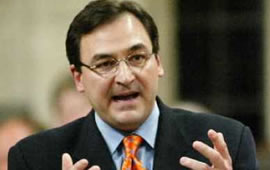Autocratic Outremont Nomination Underscores Need for Nomination Reform
 The federal Liberals appear to be undergoing something of a unity crisis within their Quebec wing, as Ignatieff’s lieutenant Denis Coderre butts heads with former former Justice Minister Martin Cauchon. The issue at hand is not over who will represent the electors of Outremont in Parliament, but over who will represent the Liberals in Outremont.
The federal Liberals appear to be undergoing something of a unity crisis within their Quebec wing, as Ignatieff’s lieutenant Denis Coderre butts heads with former former Justice Minister Martin Cauchon. The issue at hand is not over who will represent the electors of Outremont in Parliament, but over who will represent the Liberals in Outremont.
Coderre has been “reserving” safe or highly winnable seats for star candidates and party insiders, sometimes justified as affirmative action. The story has been portrayed as a fight between two men with ambitions to one day replace the current leader, with each invoking higher powers to do their bidding. Coderre’s decisions stand because the leader has a veto over all candidates, while a former minister of the crown has been reduced to having Bob Rae and Jean Chrétien ask nicely that he be allowed to run. The thought that the Liberal voters of Outremont are the only legitimate people to decide who will be their candidate in the next election is an afterthought.
That leaders or their appointed minions have the ultimate power to decide who is allowed to stand as a candidate – and not the party members or supporters – in a given riding is a testament to the autocratic nature of Canada’s political system.
Even in ridings where a nomination race is allowed to proceed, party brass normally have an interest in ensuring that their anointed candidate wins, and therefore fix the timing and rules in their favor. That the other candidate is even to be allowed on the ballot is seen as a privilege, not a democratic right.
At the very heart of Canada’s oft touted “democratic deficit” is the over-centralization of power, but one simply cannot wish it away. To decentralize power – on both sides of the House – the incentive structure needs to be altered in a way that the primary loyalty of MPs it not directed to their leaders, but to their electors. This is especially so in “safe” ridings, where the most important ballots cast are in nominations (where they are allowed to take place) and not in general elections. Competitive nomination fights – without manipulation by party brass – are needed most for Conservatives in rural and western Canada, Liberals in Toronto and western Montreal, and anywhere that MPs feel that they can relax and focus on Ottawa.
This can begin by removing nomination powers from party leaders and executives, and placing them with a non-partisan entity like Elections Canada. From there, a move to primaries where all party supporters in a given riding can select their candidate openly and fairly will go a long way to ensuring that whoever the MP for Outremont is, they are representing their electors, and not their party.